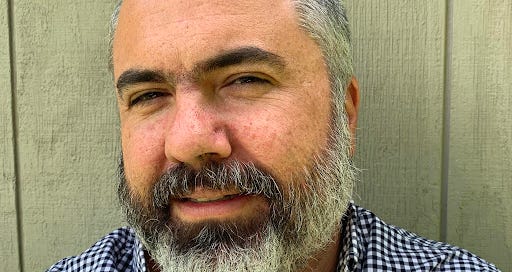The Ween Of American Rock Critics: A Conversation with Steven Hyden
Steven Hyden stops by to talk about his recent book on "Born in the U.S.A." and all things music criticism.
I didn’t think there was anything else for me to learn about Born in the U.S.A. I’ve been insistently listening to and reading about the album for most of my life. In fact, when I found out I’d be interviewing Steven Hyden, one of my favorite writers, I thought about skipping his recent book on the album, There Was Nothing You Could Do: Bruce Springsteen’s “Born In The U.S.A.” and the End of the Heartland. I’m lucky I didn’t. As with all things he writes, Steven Hyden managed to show me so many things I didn’t know about the album.
All of Steven Hyden’s books are like this. He writes about Radiohead. Pearl Jam, music rivalries, and rock music generally in a way that nobody else does. In fact, I’m convinced Hyden is the only music critic who could make you laugh and cry in a matter of one sentence. Last week, we sat down for an hour to talk about his recent Springsteen book, the jam band universe, the future of music criticism, and why reporting on a Wisconsin Flag Day parade for six years made him the writer he is today.
Last month, I saw Bruce Springsteen perform on the beach at a festival in Asbury Park. Before his set he came on stage with The Gaslight Anthem and Trey Anastasio, respectively. This speaks to how widespread Springsteen’s influence is. But as a jam band lover, I want to know if you think he fits into the jam universe. When he came out with Trey they played “Kitty’s Back”, which is probably his most jammy song.
I don't know. The Wild, The Innocent, and The E Street Shuffle is the most jammy record that he's put out. And there's an element of his following that is jam-like. People going to every show. Collecting bootlegs. An obsession with live performance. I think the nature of his following is probably his biggest connection to the jam world. But as someone who is in that space, Bruce doesn't really seem to register there. I think with Trey, it really comes down to him being from New Jersey rather than Bruce fitting in aesthetically with other jam bands.
Are there any non-jam acts in the same pantheon as Bruce that you do think register in the jam world?
Neil Young fits a bit better because he is — for lack of a better term — hippie-coded. Lou Reed and the Velvet Underground share some overlap. Tom Petty is more hippie-coded, but he still doesn’t register in the jam space. It’s a small group.
There are many things that make you stand out as a critic but there are three things that always jump out at me beyond your general command of both the history of music and the English language. To illustrate that, I pulled some quotes of stuff that you’ve written. I’m going to read them back to you and then describe why I picked them. I’m hoping you can elucidate how these ideas contribute to your criticism. Does that sound good?
Sure.
First in your top albums of 2023 list, you take a few detours, one of which is listing 5 albums that you like the idea of more than the actual album. Here’s what you wrote in that section
Sub-List No. 1
MY TOP FIVE “I LOVE THE IDEA OF THIS ALBUM MORE THAN THE ACTUAL ALBUM” ALBUMS OF 2023
5. Dolly Parton, Rockstar
I listened to 45 seconds of her cover of “Stairway To Heaven” with Lizzo. It works much better as a thought experiment than as music.
4. Garth Brooks, Time Traveler
The record he put out as part of a seven-CD box set sold exclusively at Bass Pro Shops. As one of the only music critics in America who owns it, I am obligated to put it here.
3. Mac DeMarco, One Wayne G
If you have heard all 199 songs (or nine hours and 30 minutes) of this, I am calling the police so that they can remove the bookshelf that has fallen on top of you.
2. DJ Sabrina The Teenage DJ, Destiny
This four-hour album of throwback dance-pop jams sounds incredible … for about 45 minutes at a time. If my job consisted solely of listening to this record for an entire work week, it would be No. 1 on the overall list.
1. Andre 3000, New Blue Sun
The “I love the idea of this album more than the actual album” album of the decade, and possibly the century.
Many of these blurbs made me legitimately laugh out loud. In what ways do you think humor enhances your criticism?
When music writers talk about music writing, I feel like the one thing that never gets mentioned is that music writing should be entertaining. Writers talk about how we need to forward the conversation. We need to inform readers and counteract the algorithm. But if music writing is only about recommending music, then music writing is screwed because in the modern world music writing is the least efficient way to discover new artists. You have streaming platforms. You have TikTok. You have YouTube. You have your friend group. People read music writing because they like to read. And I think that's been true forever. At this point, I think it's more important than ever that music writing is actually enjoyable to read in order to justify its existence.
When I was a kid in the 1980s and 1990s, I was the only person in my friend group that read music magazines. All my friends liked music. They bought records. They went to concerts. But they weren't discovering music by reading Spin or Rolling Stone. They discovered music on MTV and from our friend group. I read music magazines because I was interested in music, but I was also interested in music writing. Today, the people that read music writing do it because they like experiencing music through someone else's perspective. For most people, they aren’t reading just for recommendations. Why read a record review at this point? It's so much easier to go on Spotify and find the playlist that aligns with the genres you like. You'll discover 10 records in like 30 minutes.
Frankly, I look at myself partially as an entertainer. When I picture someone reading my writing, I imagine a person on their lunch break who wants to have an enjoyable 15 minutes. If I can provide that to them and, along the way, help them discover some music, then I’m very happy. So much music writing is dry and boring and academic and humorless. It honestly amazes me that people still read music writing to be entertained at all. But I’m grateful that there are people who do. If not, I wouldn’t have a roof over my head or food to feed my family.
Second, in your book Twilight of the Gods, you spend some time at the beginning defining the temporal scope of classic rock. “Classic rock begins with Sgt. Pepper’s Lonely Hearts Club Band,” you write and “Classic rock ends with Nine Inch Nails’ The Fragile.” This is a good example of the precision that is in your writing. Music criticism is often steeped in metaphors and vagueries. Do you think it is important to define things specifically?
I don’t think of myself as a particularly data-driven writer. There’s no science to music writing. I’m just trying to be as articulate as possible about things. And that’s hard when writing about music. The miracle of music is that it can convey so much emotion and truth in a non-linear, non-articulate way. People require so much coherence in all other forms of art. Like if people go see a movie and it doesn’t make sense, they get upset. At the same time, we routinely listen to songs that on paper are just a mishmash of words colliding into each other that you can’t describe in any real way. And that’s one of the great things about music. But as a critic I try to define things to make them make more sense.
Third, in your most recent book There Was Nothing You Could Do, you write the following near the end:
There’s a scenario in which Bruce Springsteen responds to the success of Born in the U.S.A. by making a record that tries to match that album’s popularity. Let’s return to 1992 for a moment. Imagine Bruce doesn’t make Human Touch or Lucky Town. Instead he writes a ton of twangy rockers in the mold of ‘Cadillac Ranch’ and ‘Darlington County.’ And, as he did with Born in the U.S.A., he follows current pop production trends so they sound a lot like ‘Achy Breaky Heart.’’ Rock radio is perplexed, though they aren’t interested in Bruce anyway, as most stations are now playing Nirvana, Pearl Jam, and Metallica songs.”
Country radio, however, loves it. They play the hell out of the record. Bruce starts wearing a cowboy hat in public. He agrees to do a duet with Garth Brooks … and it’s another hit. Bruce plays the Grand Ole Opry. He buys a house in Nashville after his ersatz country record sells six million copies.
Your writing is filled with hypothetical scenarios that you entertain very honestly. Why do you think these imaginative scenarios are so illuminating?
As a writer, I think it’s important to have an element of fandom in your writing. And I think that hypothetical thinking is something all fans do even if they aren’t totally conscious of it. We’re always imagining alternate realities. What if my favorite band had done this? What if they didn’t break up?
Keep reading with a 7-day free trial
Subscribe to Can't Get Much Higher to keep reading this post and get 7 days of free access to the full post archives.





